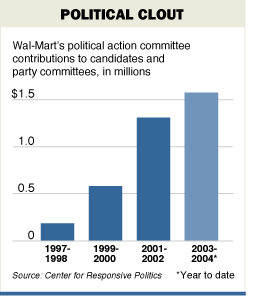In Washington, Wal-Mart has five lobbyists on its payroll, and a bench of hired guns led by Thomas Hale Boggs Jr., one of Capitol Hill's best-known lawyer-lobbyists. The company's political action committee was the biggest corporate donor to federal parties and candidates in 2003, with more than $1 million in contributions -- up from $182,000 during the 1997-98 election cycle, according to Federal Election Commission disclosure reports. Wal-Mart's PAC ranks as the second-largest in Washington, according to the Center for Responsive Politics, a nonpartisan organization that tracks political giving.Unlike most other lobbyists, who typically spread their money around pretty evenly between the two parties, Wal*Mart is focused on those who are most business friendly - read that as anti-labor and free trade.
Unlike most corporations, which contribute to both parties in rough proportion to Congress's partisan split, about 85% of Wal-Mart's checks go to Republicans. And recently Mr. Allen was named a "Pioneer" by the Bush campaign, meaning he has raised at least $100,000 by getting friends and colleagues to make contributions of up to $2,000 each.I've written previously about Wal*Marts distaste for organized labor and their famously unfair labor practices, wages and dismal benefits packages. But of course none of that has made an impact on the retail - yet. And they are determined to get into other services - and wreck those sectors like they've nearly wrecked retailing and are in the process of doing to the grocery sector (they are nominally the cause of the recent California grocery strikes). Their latest attempt to get into banking was scuttled when "[s]mall bankers pleaded with Congress to spare them the fate of mom-and-pop hardware and variety stores, which, they said, were strangled by Wal-Mart. "
The partisan giving is a nod to Wal-Mart's hostile relationship with organized labor and its dependence on free-trade agreements. Wal-Mart defends its lopsided support, saying it's supporting pro-business candidates.
 Don't think that top management is taking that defeat as a sign to slow down. Instead, they've decided to step up their lobbying efforts. The graph to the left shows the rapid increase in Wal*Mart's spending in Washington.
Don't think that top management is taking that defeat as a sign to slow down. Instead, they've decided to step up their lobbying efforts. The graph to the left shows the rapid increase in Wal*Mart's spending in Washington.
And with the spending of all that money, comes power where it counts - in the halls of Congress:
"Congressional allies rushed to offer advice, including Trent Lott, then Senate majority leader. Mr. Lott arrived in Bentonville in late 1999 with a simple message, according to a congressman who attended the meeting: Increase your profile and open your wallet.With their newfound political power, Wal*Mart is poised to continue their expansion both inside and outside the US; they've recently won concessions from the Chinese government to open up to 35 stores there, despite a trade treaty with the US that retailers will be limited to 30 outlets. But of course like all businesses, there is only one thing in sight for Wal*Mart executives, profits. And damn everything and everyone, including - or perhaps especially - American workers. A phrase from a sentence early in the article, I think, sums it all up so neatly:
So Wal-Mart executives set out to beef up their political action committee -- an account made up of voluntary employee contributions that executives use to make political donations. (Federal law prohibits direct corporate contributions to party committees and candidates.) At an August 2000 meeting attended by thousands of Wal-Mart managers, buckets were passed around for donations, as well as forms authorizing automatic paycheck deductions for the PAC."
"...set out to transform itself from a company without a Washington presence to one that could bend public policy to suit its business needs."
I'll leave it as an exercise for the reader to ponder the real purpose of "public policy."
No comments:
Post a Comment